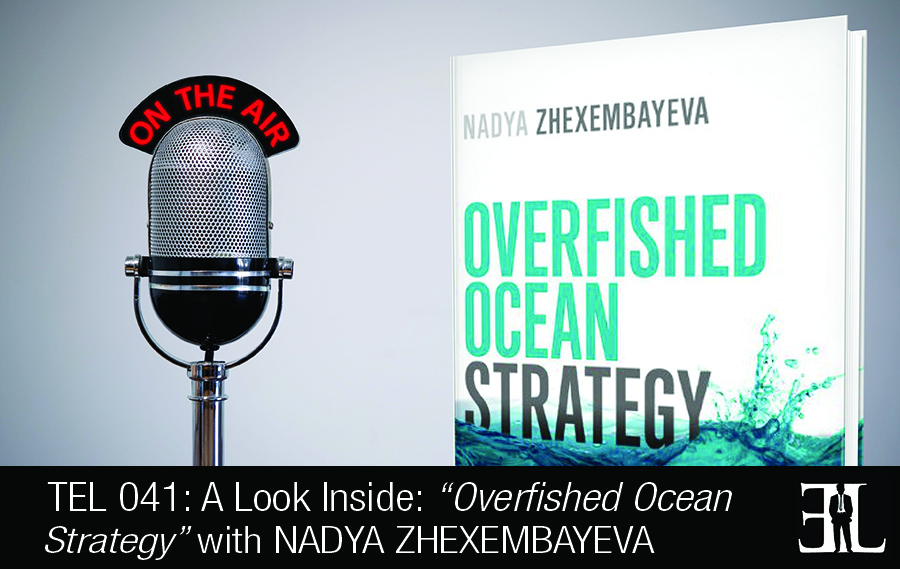
A Preview of Overfished Ocean Strategy with Nadya Zhexembayeva

A summary of things you should know about Overfished Ocean Strategy according to Nadya Zhexembayeva:
Introduction
In this episode Nadya Zhexembayeva takes a deep dive into her book, Overfished Ocean Strategy. This book is not your typical guide on how to be innovative, but instead is a survival plan for your business during times of recession. The goal for Zhexembayeva is to provide you and other small business owners with a look into the future of the global economy along with successful stories of businesses that are driving innovation and strategic realignment in order to survive.
The Book’s Unique Quality
The exciting part for me was to create an experience rather than a book. My hope was to help business owners, executives and business students have a conversation around disappearing resource base and how to not only survive but thrive in that market reality.
The Best Way To Engage
The introduction and first two chapters of the book lay the foundation of what is going on in the economy and after that it is all about principles of innovation where you can enter and exit wherever you need to.
The Reader’s Takeaway
If your company doesn’t have a strategy to deal with the resource depleted world, it’s time to develop one.
A Deep Dive Into The Book
As a business owner I have been trying to understand what is going on in the last five to seven years with the global economy and how I should be preparing my own company and customers company for what is ahead. The stories in the media are saying that we will come out of recession and then everything will be alright but what I’ve noticed is very few people are talking about the disappearing resource base.
The story of the book is about how businesses understand this reality and I discovered that a number of companies that are taking this challenge as an opportunity to drive innovation and strategic realignment in a drastic way. In the book you will find five essential principles of innovation.
Principle #1 is moving from linear economy to circle economy. This is really about the stories that have been showing up in different media or scientific research but hasn’t been taken mainstream.
Principle #2 is moving away from vertical to horizontal. This principle is about moving your way from a very narrow focus to entering a much wider focus. Most of the time we are taught to look nearby for ideas for new company advantage but the pioneers of Overfished Ocean Strategy don’t look nearby, they actually expand their horizon.
Principle #3 speaks about new sources of growth. The grown in traditional companies comes from selling more things to more people. The pioneering companies try to look at the product of service they provide and perspective of value.
The last two principles in the book I take you from plan to model and from department to mindset. It’s all about how to organize inside the company and what we need to do to prepare ourselves for a resource depleted world.
Notable Quotes From The Book
“The stone age did not end because we ran out of stones.” – Sheikh Yamani
The Credibility/Inspiration Of The Author
I am a business owner in the consulting world and teach at business schools around the world to primarily executives. I have been working in executive education since 2006 nonstop.
I wanted to find a new way of innovated business models and strategies for companies and started researching ways to do that. I was trying to understand what makes companies enter this new domain and what makes the path successful for those who succeed in this approach. This was kind of accidental research and a few publishers asked me if I’d consider writing a book about this particular topic.
Other Books Recommended By The Author
The Birth of the Chaordic Age by Dee Hock
More Information About This Book and The Author
Buy Overfished Ocean Strategy by Nadya Zhexembayeva on Amazon today
Visit OverfishedOceanStrategy.com to learn more about Nadya and her book
Follow Nadya Zhexembayeva on Twitter
More Information About This Episode
Download the full transcript here
Listen on iTunes, Stitcher , and SoundCloud
Related books: Zero to One: Notes on Startups, or How to Build the Future by Peter Thiel and Blake Masters | Aligning Strategy and Sales by Frank Cespedes | Exponential Organizations by Salim Ismail
What did you like and not like about this episode? Fill out this one minute survey here.
 The Entrepreneurs Library
The Entrepreneurs Library






